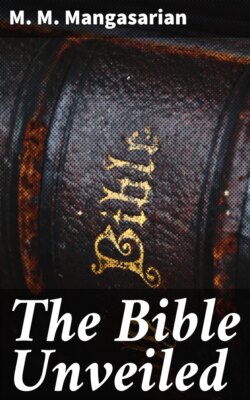Читать книгу The Bible Unveiled - M. M. Mangasarian - Страница 10
На сайте Литреса книга снята с продажи.
Catholic and Protestant Bibles
ОглавлениеTable of Contents
THE Catholics do not believe in the Protestant bible; the Protestants do not trust the Catholic bible. Each tells the truth about the bible of the other, but not of his own.
As in the case of the Jew and the Christian, neither the Catholic nor the Protestant seems to realize that in condemning each other's bible as untrustworthy, or as a manipulated copy, they are condemning also each his own bible. If the Catholics have tampered with the Word of God, as the Protestants claim they have; and if the Protestants have a defective bible, as the Catholics charge, then the claim that God has preserved his revelation from human error falls to the ground. If God did not protect the Protestant bible from corruption, he is liable to be equally unconcerned about the Catholic bible, from which it follows that the Word of God can be, and has been, corrupted, which, if true—and both Catholics and Protestants say it is—then there is no incorruptible Word of God.
The Rationalist shares with the Catholic the latter's opinion of the Protestant bible; and of the Catholic bible, it doubts its reliability just as the Protestants do. Putting what the Protestants and Catholics say of each other's bible side by side, the Rationalist arrives at the conclusion that both bibles are untrustworthy.
Let us now consider another phase of the Catholic-Protestant position on the bible. The Protestants are apparently very anxious to make the reading of the bible in the home and the school imperative; the Catholics, on the other hand, seek to make it equally imperative not to read the bible. It is well known that the popes of Rome, as heads of the church and vicars of Christ, have repeatedly forbidden the reading of the bible by the people. An index of forbidden books is kept in Rome for the guidance of the faithful, and, surprising as it may seem, the bible was placed upon this Index Expurgatorius by the popes themselves. The bull of Pius IV. reads: "Whosoever shall dare to own a copy of this book (bible) and read it without having procured a special dispensation shall not receive absolution for his sins."
Similar prohibitions were given by Pius VI., Leo II, XII., Gregory XVI., Pius IX. in his Syllabus, and Clement XI. in his famous bull, Unigenitus. In the Index of forbidden books of Pope Innocent XI., 1704, one of the books forbidden is "the bible in any of the popular languages."
This prohibition was not against the Protestant bibles only, for the fourth clause in the Index is a warning against Catholic bibles as well, "bibliorum Catholicis autoribus versorum."
My sympathies in this matter are with the Catholics; if the bible is an infallible book, we ought to have an infallible reader. To say that everybody may interpret the bible as he pleases is to say that the bible has no meaning at all, except what the readers themselves read into it. But if it has an infallible meaning, only an infallible interpreter can pronounce upon it. And when it is remembered that an erroneous interpretation might be the means of damning the souls of many, it becomes a positive duty not to read the book for one's self. The Pope may read it, because being infallible, he can not misread it. I admire the logic of the Catholic church in this respect. Grant the premises that the bible is a special revelation—and infallible—and all the arguments of the Protestants against the Catholic position shatter to pieces, like the waves against a rock.
But, as already intimated, the Protestants believe in putting the bible in every house, hotel and school. They want every man to carry a pocket-bible; and if women had pockets they would be urged to do the same. From all this one would suppose that they were very anxious to get everybody acquainted with the contents of the bible. The different ministerial assemblies, at their annual gatherings, recently attacked by official resolutions the decision of the Supreme Court of Illinois, which made the reading of the bible in the public schools unconstitutional. The Protestant churches do not seem to care at all about the constitution—they want the bible in the schools, constitution or no constitution. In the twentieth century the supreme court rules the bible out of the people's schools! Had not Greece fallen before the wave of Asiatic mysticism, the bible would have been ruled out of Europe two thousand years ago. The Supreme Court of Illinois is doing now what the supreme court of Europe should have done in the year one. Notwithstanding protests to the contrary, I am of the opinion that the Protestants are at heart as opposed to the reading of the bible as the Catholics. Indeed, they would have everybody read the bible, but they must not read it with their own eyes, but as Calvin, or Wesley, or Luther read it. But that is not different from the Catholic position that the Pope must read the bible for the people. If the Protestants really permit each to read and interpret the bible according to his best thought, why are there heresy trials among them? That is a searching question. Heresy trials prove beyond a doubt that the Protestants do not wish anybody to read the bible for himself. See what the church did to me for reading the bible with my own eyes. At the age of twenty-five, myself, my wife and baby were dispossessed of church, position and support. What was done to me for reading the bible with my own eyes has been done to thousands of others?
"Let me read the bible for you," says the Catholic.
"Read the bible with my eyes," says the Protestant.
What is the difference?
